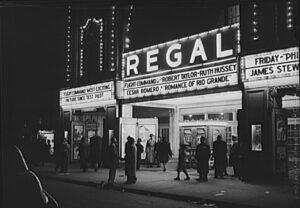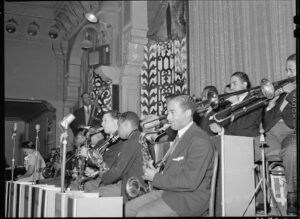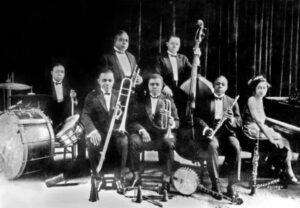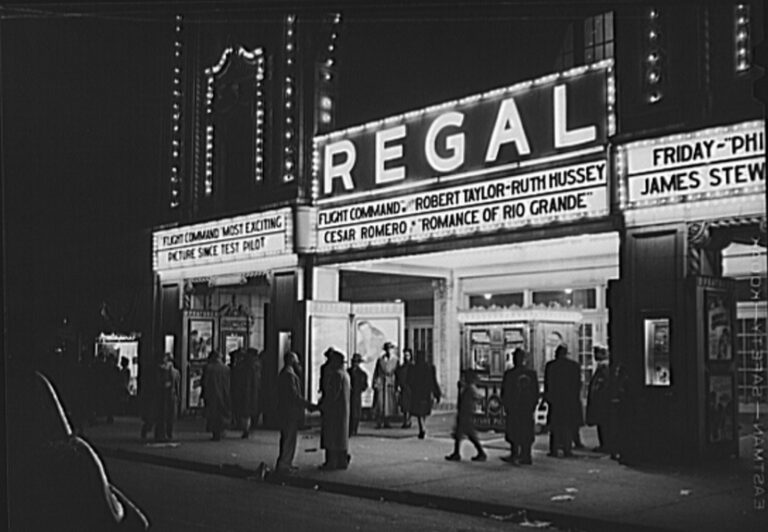A Brief History of Bronzeville’s Music Scene
Bronzeville has been home to several legendary performers and iconic venues throughout the neighborhood’s history. In celebration of Bronzeville’s rich past and to mark progress on our King Drive properties, we’re taking a moment to reflect on the unique venues and legendary artists that once filled Bronzeville’s music scene.

Significant Venues
As the century turned and more and more African Americans moved to Bronzeville from the rural South looking for brighter opportunities, several clubs and theatres emerged to meet entertainment needs. Several venues became community favorites and local treasures, including Grand Theater, Dreamland Café, The 708 Club, Pepper’s Lounge and the Vendome Theater. However, a number of these sites became well-known far beyond the boundaries of Bronzeville.
Widely recognized as one of the most important jazz clubs in the country during its prime, Sunset Cafe, also known as The Grand Terrace Cafe, was the city’s premier theatre from the 1920s to the 1940s. The club’s manager, Joe Glazer, invited several of the nation’s top jazz performers to entertain guests, including his client, Louis Armstrong. While the building experienced some remodels and reopenings, it became officially recognized as a landmark in 1998. Today, the venue, located at 315 East 35th Street, functions as an Ace Hardware. However, some of the original murals that filled the historic walls of the Sunset Cafe remain.
At the time, Savoy Ballroom and the neighboring Regal Theater, located only a few blocks South of our King Drive properties, were credited as some of the first major stakes in establishing a new center of gravity for the African American community in Chicago. Savoy’s half-acre ballroom and the Regal Theater’s opulent auditorium offered hard-to-find performance space. Top jazz, blues and soul performers across the country, including Duke Ellington, Billie Holiday, Ella Fitzgerald, Aretha Franklin and Stevie Wonder, left their mark on the famed clubs. The buildings were demolished in 1973 and are now home to the Harold Washington Cultural Center.

While the music scene thrived in Bronzeville for decades, the Great Depression brought unforeseen hardships to the community. Attendance in the top-tier theatres slipped for a time, but the 1940s brought back a resurgence in entertainment, with bebop music flourishing and nearly every big name in jazz returning.
Uplifting Careers
Throughout Bronzeville’s storied music history, multiple jazz, blues and soul legends visited the crowded theatres and clubs that filled the neighborhood. Music icons and various big band groups traveled the country to play the community’s numerous renowned venues. While many continued touring, countless others stayed in Bronzeville to expand their career and relish in the neighborhood’s rich culture.
As the jazz epicenter moved to Chicago from New Orleans in the late 1910s, so followed Joe Oliver — also known as King Oliver. Along with composing numerous celebrated works of music, Oliver played both individually on the cornet and in big bands along Chicago’s East 35th Street. He was also a pioneer in the field and mentored numerous young jazz artists throughout the city, including Louis Armstrong. After playing in Oliver’s band — the most influential jazz band in Chicago at the time — and earning a grand reputation competing in music contests throughout the neighborhood, Armstrong became recognized as perhaps the single most important jazz act during the genre’s heyday.

Bronzeville native Nat “King” Cole was a legendary music personality and eventually became one of the neighborhood’s most well-known residents. Surrounded by a community rich with jazz and soul history, it didn’t take long for Cole to discover his passion for music. While living at 4023 South Vincennes Avenue, Cole took advantage of Bronzeville’s iconic venues and played at both the Savoy Ballroom and the Regal Theater before furthering his career around the United States.
Through Sage Collective’s vision, we are proud to contribute to the legacy of African American culture, community and success that is, and always has been, the heart and soul of Bronzeville.

